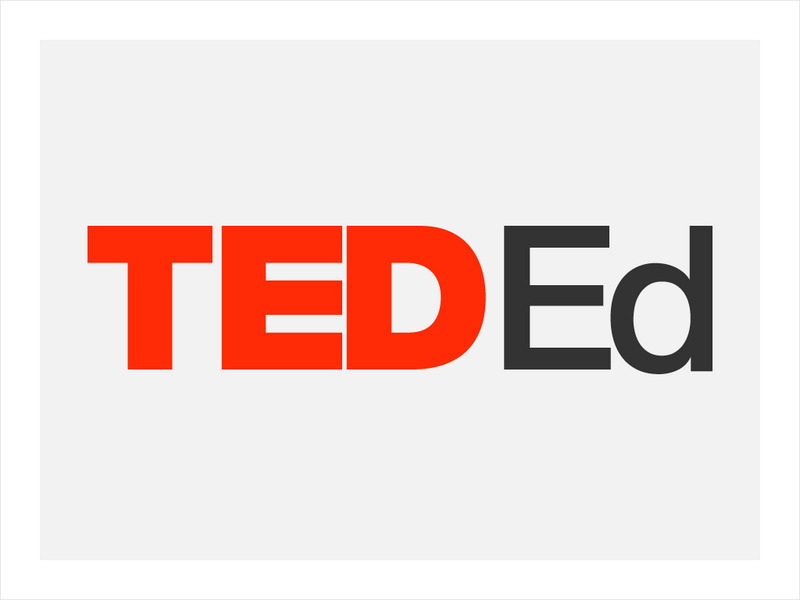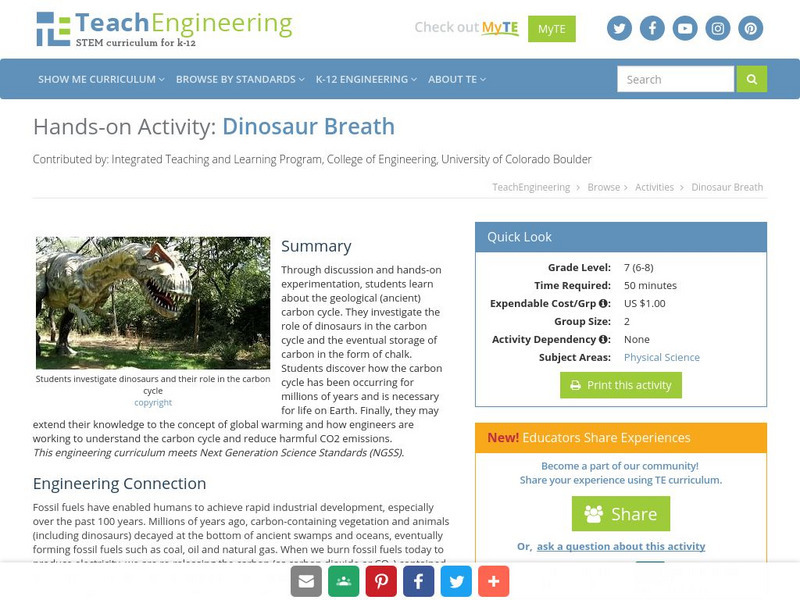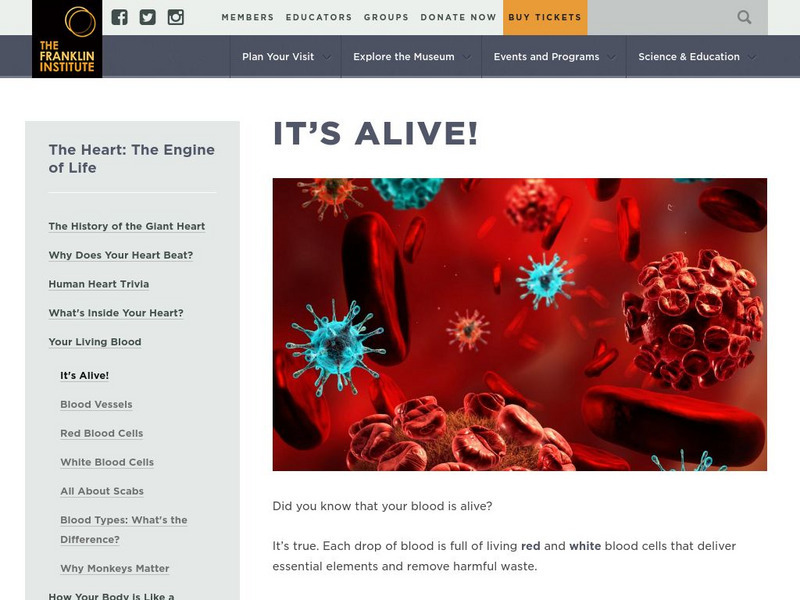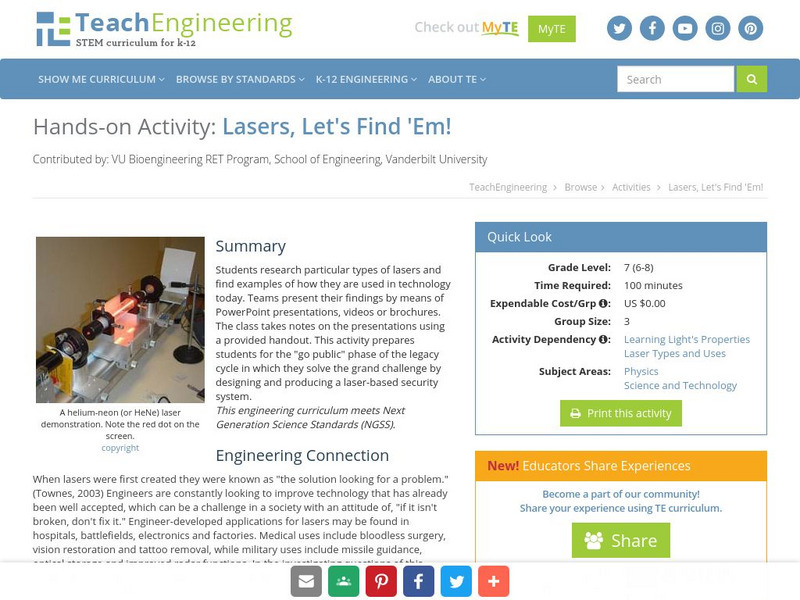Hi, what do you want to do?
TED Talks
Ted: Ted Ed: How Breathing Works
This video describes how the process of breathing in the human body works. [5:19] Includes a brief quiz and a list of additional resources to explore.
CPALMS
Florida State University Cpalms: Florida Students: Knights of the Round and Round Table: The Carbon Cycle
Resource to help learn about the carbon cycle.
Environmental Education for Kids
Eek!: Activity: Trees and Air Quality
Site offers lessons and activities designed to supplement study of the environment and ecology. Concise explanations are presented on the importance of trees in our world. Also, problem solving and creative thinking is encouraged...
Annenberg Foundation
Annenberg Learner: The Habitable Planet: Carbon Lab
An interactive lab simulation demonstrates the effects of increased carbon in the atmosphere and how that increase contributes to climate change. A data table for student records is available for download.
Climate Literacy
Clean: Carbon Cycle
This activity from NOAA Earth System Research Laboratory introduces students to the current scientific understanding of the greenhouse effect and the carbon cycle. The activity leads them through several interactive tasks investigating...
TeachEngineering
Teach Engineering: Dinosaur Breath
Through discussion and hands-on experimentation, students learn about the geological (ancient) carbon cycle. They investigate the role of dinosaurs in the carbon cycle and the eventual storage of carbon in the form of chalk. Students...
TeachEngineering
Teach Engineering: Environment
Through 10 lessons and more than 20 hands-on activities, students are introduced to the concept of an environment and the many interactions within it. As they learn about natural and human-made environments, as well as renewable and...
The Franklin Institute
Franklin Institute Online: Your Living Blood: It's Alive!
How does blood supply your body with the nourishment it needs? This site focuses on systemic circulation. Learn more about this fascinating part of your body when you check out this resource.
Ducksters
Ducksters: Science for Kids: Breathing and the Respiratory System
Kid's learn about the science of human breathing and the lungs. How we get oxygen into our blood and remove carbon dioxide.
TeachEngineering
Teach Engineering: Lasers, Let's Find 'Em!
Students research particular types of lasers and find examples of how they are used in technology today. Teams present their findings by means of PowerPoint presentations, videos or brochures. The class takes notes on the presentations...
McGraw Hill
Online Learning Center: Respiration
This is a very detailed site on breathing/respiration. It covers system organization, mechanics, exchange of gases, and oxygen transport. A very thorough site.
Science Buddies
Science Buddies: How Does a Chick Breathe Inside Its Shell?
Whether a chick can breathe inside its shell is an interesting question. Every animal needs oxygen to survive, so the chick must get air somehow. Try this science project to discover if the pores in a chicken egg shell allow water to...
TeachEngineering
Teach Engineering: Moebius Strips
In this activity, students make Moebius strips and use them to demonstrate the interconnectedness of an environment. They will explore the natural cycles (water, oxygen/carbon dioxide, carbon, nitrogen) within the environment.
University of Oregon
University of Oregon: Mars' Atmosphere
Here is a comparison of the atmospheric composition of Earth, Venus and Mars.
North Central Regional Educational Laboratory
Kids Learn: Respiratory System Internet Workshop
Come and explore this internet workshop that was designed to introduce you to a study on the respiratory system. Students and teachers will benefit from this resource.
TED Talks
Ted: Ted Ed: How Do the Lungs Work?
When you breathe, you transport oxygen to the body's cells to keep them working, while also clearing your system of the carbon dioxide that this work generates. How do we accomplish this crucial and complex task without even thinking...
Science Buddies
Science Buddies: Rooftop Gardens: Are They a Cool Idea?
Around the world, rooftops are being transformed into living green expanses. Besides beauty, rooftop gardens have a number of advantages, including growing food and taking carbon dioxide out of the air while releasing breathable oxygen....
CK-12 Foundation
Ck 12: Life Science: Respiration
[Free Registration/Login may be required to access all resource tools.] We breathe because we need oxygen. Breathing also releases carbon dioxide from our bodies into the air. The respiratory system is the body system that brings air...
BBC
Bbc: Gcse Bitesize: Damage to the Environment
The atmosphere has not always been the same. It has been much the same, but nevertheless now contains more nitrogen and oxygen, and less carbon dioxide, than it did when the earth first formed. Recently, the addition of greenhouse gases...
Sophia Learning
Sophia: Plants: Lesson 5
This lesson will present the characteristics of plants and their impact on living things. It is 5 of 5 in the series titled "Plants."
Science4Fun
Science4 Fun: Photosynthesis
What is photosynthesis? Discover how plants absorb ingredients, the phases of the process, and the importance.
BiologyWise
Biology Wise: Importance of Photosynthesis
Explains what the products of photosynthesis are, how we depend on this process for the oxygen we breathe, how it maintains the balance between carbon dioxide and oxygen in the environment, and how it supports all other living organisms...
Ducksters
Ducksters: Science for Kids: Earth's Atmosphere
Kids learn about the science of the Earth's Atmosphere. Carbon dioxide, Oxygen, Nitrogen and more make up clouds and weather.
Enchanted Learning
Enchanted Learning: The Earth's Atmosphere
The Earth's atmosphere is a thin layer of gases that surrounds the Earth. It composed of 78% nitrogen, 21% oxygen, 0.9% argon, 0.03% carbon dioxide, and trace amounts of other gases. This thin gaseous layer insulates the Earth from...





